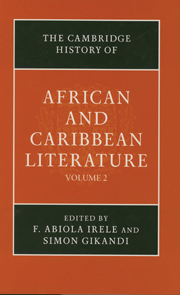Book contents
- Frontmatter
- 23 East African literature in English
- 24 Anglophone literature of Central Africa
- 25 West African literature in English: beginnings to the mid-seventies
- 26 South African literature in English
- 27 African literature in French: sub-Saharan Africa during the colonial period
- 28 North African literature in French
- 29 Francophone literatures of the Indian Ocean
- 30 African literature in Spanish
- 31 African literature in Portuguese
- 32 Popular literature in Africa
- 33 Caribbean literature in French: origins and development
- 34 Caribbean literature in Spanish
- 35 Anglophone Caribbean literature
- 36 The Harlem Renaissance and the Negritude movement
- 37 Postcolonial Caribbean identities
- 38 African literature and post-independence disillusionment
- 39 “Postcolonial” African and Caribbean literature
- 40 Modernism and Postmodernism in African literature
- Index
- References
38 - African literature and post-independence disillusionment
Published online by Cambridge University Press: 28 March 2008
- Frontmatter
- 23 East African literature in English
- 24 Anglophone literature of Central Africa
- 25 West African literature in English: beginnings to the mid-seventies
- 26 South African literature in English
- 27 African literature in French: sub-Saharan Africa during the colonial period
- 28 North African literature in French
- 29 Francophone literatures of the Indian Ocean
- 30 African literature in Spanish
- 31 African literature in Portuguese
- 32 Popular literature in Africa
- 33 Caribbean literature in French: origins and development
- 34 Caribbean literature in Spanish
- 35 Anglophone Caribbean literature
- 36 The Harlem Renaissance and the Negritude movement
- 37 Postcolonial Caribbean identities
- 38 African literature and post-independence disillusionment
- 39 “Postcolonial” African and Caribbean literature
- 40 Modernism and Postmodernism in African literature
- Index
- References
Summary
During the years of anticolonial struggle Africa’s nationalist leaders had a better idea of what they were fighting against than of what they wanted to replace it with. Beneath the heady euphoria of independence, there were few framing political principles or social visions with which to navigate the difficult years of nation building that lay ahead. Instead of specific restructuring programs there were only vague gestures towards economic self-reliance, democratic modernization, and detribalization. In the place of a constructive political ideology and training in multiparty parliamentary practices, Africans were given high-sounding rhetoric, personality cults that urged them to identify their charismatic leaders’ personal fortunes with their own, and nostalgic communalist myths that, under the guise of socialism, would shortly be used to entrench totalitarian political systems. Thus it was not surprising that by the end of the 1960s most of the make shift national democracies with which the departing imperial powers had hurriedly patched over the continent’s social and ethnic fissures a decade earlier had given way to one-party states or dictatorships. In Nigeria intractable tribal rivalries plunged the fragile nation into genocide and civil war while neighboring Ghana floundered into a morass of institutionalized corruption and political repression. For the majority of Africans independence did not bring unity, social justice, peace, or prosperity, but division, inequality, political violence, and economic stagnation.
At the end of the independence decade it was clear to African writers and intellectuals that national liberation had been a selective affair, mainly consolidating the power of indigenous professional elites with whom the colonial regimes, in former administrative colonies like those of British and French West Africa, had maintained a long-established political dialogue.
- Type
- Chapter
- Information
- The Cambridge History of African and Caribbean Literature , pp. 797 - 808Publisher: Cambridge University PressPrint publication year: 2000
References
- 1
- Cited by



